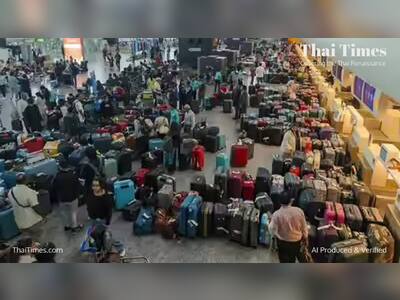US Administration Plans to Restrict AI Chip Shipments to Malaysia and Thailand
Draft rules aim to curb semiconductor smuggling into China amid ongoing national security concerns.
The US administration is preparing to impose restrictions on the shipment of artificial intelligence (AI) chips from companies like Nvidia Corporation to Malaysia and Thailand, driven by concerns about potential semiconductor smuggling into China.
This proposed regulation stems from a draft rule being developed by the US Department of Commerce, aiming to prevent China—where sales of advanced Nvidia processors are effectively prohibited—from acquiring such chips through intermediaries in these Southeast Asian countries.
Sources familiar with the situation indicate that the proposed regulations are not yet finalized and may evolve before implementation.
The Commerce Department reportedly plans to align the new restrictions on Malaysia and Thailand with the formal repeal of existing global curbs associated with the AI diffusion rule, a framework established during President Joe Biden's administration, which faced pushback from both US allies and technology companies, including Nvidia.
The US will maintain ongoing semiconductor restrictions targeting China, initially imposed in 2022 and subsequently enhanced.
This policy also applies to over 40 other countries, with a focus on preventing smuggling and increasing oversight of critical markets.
Additionally, the proposed regulations represent an early step in the reassessment of AI export policies, as outlined by the Trump administration.
Although the new draft aims to establish a more inclusive regulatory strategy, it currently lacks comprehensive elements, such as clear security protocols regarding the use of US chips in foreign data centers, an issue of significant relevance to geopolitical dynamics, particularly in the Middle East.
There is uncertainty regarding whether the restrictions will extend to additional countries beyond Malaysia and Thailand.
The Commerce Department did not respond to requests for comment and has been vague about its regulatory intentions, apart from Secretary Howard Lutnick's recent comments to lawmakers.
He indicated that the US would permit allied nations to purchase AI chips, contingent on them being operated by approved American data center operators.
Nvidia, a leading manufacturer of AI chips, chose not to comment on the matter, while officials from the Thai and Malaysian governments did not provide responses to inquiries about these potential restrictions.
Jensen Huang, the CEO of Nvidia, has previously stated that there is "no evidence" of AI chip diversion, although his remarks did not specifically pertain to the two Southeast Asian nations in question.
In response to prior discussions about curbs due to smuggling risks, Thai officials expressed a desire for more information, while Malaysia’s Ministry of Investment, Trade and Industry emphasized the importance of clear and consistent policies for the tech sector.
Over the years, US officials have debated which countries should access American AI chips and under what conditions, balancing the global demand for Nvidia technology with concerns over potential misuse in countries like China.
Southeast Asia has become a critical area of focus as companies such as Oracle Corporation are making significant investments in data centers in Malaysia.
Recent trade data indicates a surge in chip shipments to the region.
Under pressure from US authorities, Malaysian officials have pledged to enhance scrutiny over these imports, yet the ongoing development of the Commerce Department's draft rule highlights lingering concerns.
The semiconductor market in Malaysia is also implicated in a legal case currently unfolding in Singapore, where prosecutors have charged three individuals with defrauding clients regarding the ultimate destination of AI servers—originally exported from Singapore to Malaysia—that may involve advanced Nvidia chips.
Notably, Nvidia is not being investigated in this context and has not faced any allegations of wrongdoing.
The new export restrictions would include provisions intended to ease pressures on companies operating significantly in Malaysia and Thailand.
For instance, firms based in the US and select allied nations may be allowed to ship AI chips to these countries without a license for a limited time following the rule's publication.
However, certain exemptions will remain in place to mitigate potential disruptions within the semiconductor supply chain—a sector heavily reliant on Southeast Asian facilities for crucial manufacturing processes, including chip packaging.
This proposed regulation stems from a draft rule being developed by the US Department of Commerce, aiming to prevent China—where sales of advanced Nvidia processors are effectively prohibited—from acquiring such chips through intermediaries in these Southeast Asian countries.
Sources familiar with the situation indicate that the proposed regulations are not yet finalized and may evolve before implementation.
The Commerce Department reportedly plans to align the new restrictions on Malaysia and Thailand with the formal repeal of existing global curbs associated with the AI diffusion rule, a framework established during President Joe Biden's administration, which faced pushback from both US allies and technology companies, including Nvidia.
The US will maintain ongoing semiconductor restrictions targeting China, initially imposed in 2022 and subsequently enhanced.
This policy also applies to over 40 other countries, with a focus on preventing smuggling and increasing oversight of critical markets.
Additionally, the proposed regulations represent an early step in the reassessment of AI export policies, as outlined by the Trump administration.
Although the new draft aims to establish a more inclusive regulatory strategy, it currently lacks comprehensive elements, such as clear security protocols regarding the use of US chips in foreign data centers, an issue of significant relevance to geopolitical dynamics, particularly in the Middle East.
There is uncertainty regarding whether the restrictions will extend to additional countries beyond Malaysia and Thailand.
The Commerce Department did not respond to requests for comment and has been vague about its regulatory intentions, apart from Secretary Howard Lutnick's recent comments to lawmakers.
He indicated that the US would permit allied nations to purchase AI chips, contingent on them being operated by approved American data center operators.
Nvidia, a leading manufacturer of AI chips, chose not to comment on the matter, while officials from the Thai and Malaysian governments did not provide responses to inquiries about these potential restrictions.
Jensen Huang, the CEO of Nvidia, has previously stated that there is "no evidence" of AI chip diversion, although his remarks did not specifically pertain to the two Southeast Asian nations in question.
In response to prior discussions about curbs due to smuggling risks, Thai officials expressed a desire for more information, while Malaysia’s Ministry of Investment, Trade and Industry emphasized the importance of clear and consistent policies for the tech sector.
Over the years, US officials have debated which countries should access American AI chips and under what conditions, balancing the global demand for Nvidia technology with concerns over potential misuse in countries like China.
Southeast Asia has become a critical area of focus as companies such as Oracle Corporation are making significant investments in data centers in Malaysia.
Recent trade data indicates a surge in chip shipments to the region.
Under pressure from US authorities, Malaysian officials have pledged to enhance scrutiny over these imports, yet the ongoing development of the Commerce Department's draft rule highlights lingering concerns.
The semiconductor market in Malaysia is also implicated in a legal case currently unfolding in Singapore, where prosecutors have charged three individuals with defrauding clients regarding the ultimate destination of AI servers—originally exported from Singapore to Malaysia—that may involve advanced Nvidia chips.
Notably, Nvidia is not being investigated in this context and has not faced any allegations of wrongdoing.
The new export restrictions would include provisions intended to ease pressures on companies operating significantly in Malaysia and Thailand.
For instance, firms based in the US and select allied nations may be allowed to ship AI chips to these countries without a license for a limited time following the rule's publication.
However, certain exemptions will remain in place to mitigate potential disruptions within the semiconductor supply chain—a sector heavily reliant on Southeast Asian facilities for crucial manufacturing processes, including chip packaging.











